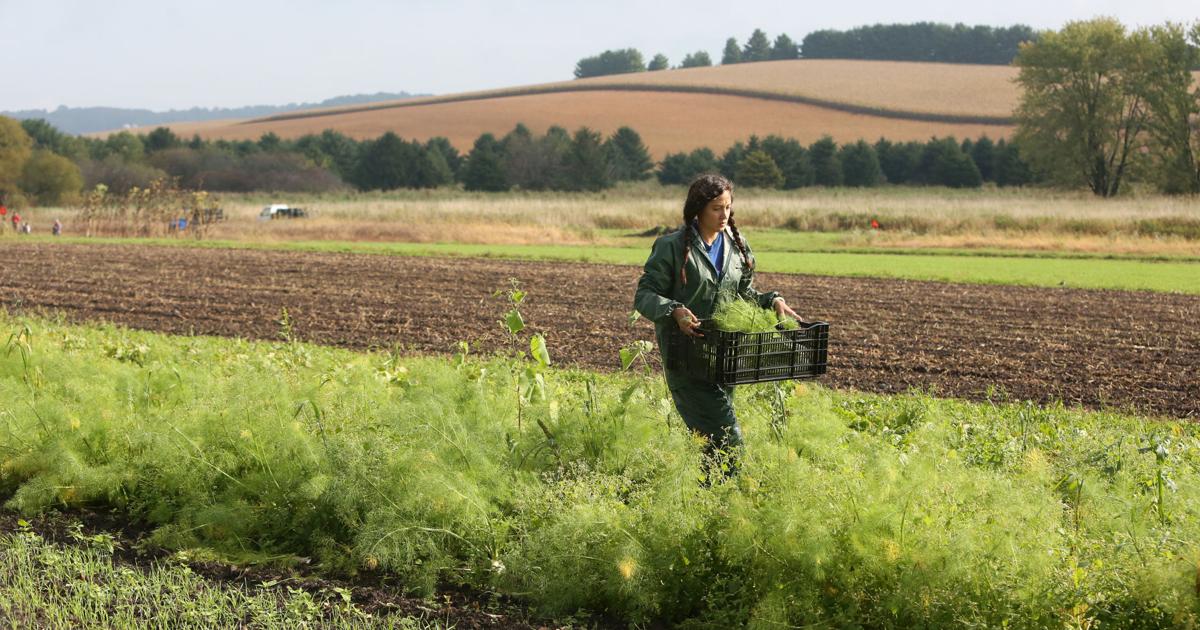What can Wisconsin agriculture learn from California policy? A lot when it comes to farm workers and climate justice.
Last summer, the United States experienced record-breaking heat waves, disrupting daily life with scorching temperatures. Such conditions are unpleasant for most Americans but can be life-threatening for farm workers who work for long hours outdoors with no guaranteed access to shade, water or rest. As extreme weather events become more common and federal protections weaken, it is up to states and consumers to step up to keep workers safe.
Wisconsin, with its large agricultural workforce and few statewide labor protections, has a unique opportunity to lead. Drawing lessons from California, a state that has already begun to reckon with extreme heat and its impacts on farmworkers, Wisconsin could set standards that prioritize farmworker health through both government policies and consumer protections.
California has developed the nation's strictest labor standards for extreme heat, pesticide exposure and wildfire smoke. The Heat Illness Prevention Standard, introduced in 2005, requires employers to provide access to water, shade and rest during intense heat. These protections were later expanded to include wildfire smoke and pesticide exposure.
However, enforcement remains inconsistent. Despite the measures, heat-related illnesses and pesticide poisonings continue to occur. One study estimated that more than a fifth of California employers never monitor for heat illnesses, evidence that strict policies fail without strong enforcement.
Nearly 20 years after California's first heat standard, only six other states have adopted similar protections. In most of the U.S., states rely on farm labor policies from federal agencies such as OSHA and the Department of Labor, which have historically excluded farmworkers from basic rights such as overtime pay, unionization and robust safety enforcement.
Under the first Trump administration, budget cuts and cuts were commonplace even in nonagricultural sectors, weakening enforcement of labor standards for all workers. Once Trump was back in office, his administration moved quickly to return to weakened federal programs. In June of this year, the National Institute for Occupational Safety and Health (NIOSH), an agency responsible for research to inform OSHA policymaking, was disbanded. Additionally, the Trump administration permanently closed 11 OSHA offices.
Wisconsin, like most Midwestern states, relies on federal OSHA standards to regulate agricultural work. Although the Biden administration had begun drafting a federal rule to prevent heat injuries and illnesses, the process has since been paused.
Wisconsin currently has no state-specific heat protection measures such as rest breaks, shade or water access standards. Undocumented workers are also often afraid to report unsafe conditions, and small farms are rarely inspected because OSHA does not routinely monitor operations with fewer than 10 employees. This stress, coupled with rising temperatures, extreme rainfall and changing crop seasons, is negatively impacting the state's agriculture and putting workers at increased risk of heat stroke, dehydration and stress-related health problems.
In Wisconsin, adopting heat safety measures and improving reporting mechanisms would protect workers and set a model for proactive leadership. Important steps in this process include including small farms in regulatory oversight and, in particular, providing resources for compliance. Stronger worker protections, fair labor certification programs, and coalition-driven sustainability efforts could close the gap between farmworker safety and small farm profitability.
In an interview with the Soil Health and Agroecological Living Lab (SHALL), one farmworker noted, “Agriculture is unpredictable. With increasing climate variability, traditional labor standards are difficult to apply, especially when there is not much support for smaller farms that employ farmworkers.”
Even well-intentioned businesses can struggle to meet new demands without adequate funding or training. Government leadership and consumer engagement must go hand in hand to ensure effective and practical protection measures.
Many Americans are unaware of the harsh conditions to which the food they eat is subjected, such as piece-rate wages (pay based on units harvested rather than hours worked), pesticide exposure, and dangerous heat. Yet most Americans unconsciously accept these risks every time they go to the grocery store.
A fair and sustainable food system depends on stronger government policies and informed consumer action. As climate change worsens and federal protections weaken, Wisconsin has the opportunity and responsibility to act. Protecting the health of farmworkers through climate-smart labor standards is not only a moral imperative, but also essential to the resilience of Wisconsin's agricultural future.
Grace Voss is a UW-Madison student majoring in community and environmental sociology.
Share your thoughts on this topic by sending a letter to the editor to tctvoice@madison.com. Include your full name, hometown and phone number. Your name and location will be published. The phone number is for verification purposes only. Please limit your letter to a maximum of 250 words.
